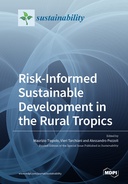Explore

Risk-Informed Sustainable Development in the Rural Tropics
0 Ungluers have
Faved this Work
Login to Fave
Many people live in rural areas in tropical regions. Rural development is not merely a contribution to the growth of individual countries. It can be a way to reduce poverty and to increase access to water, health care, and education. Sustainable rural development can also help stop deforestation and reduce livestock, which generate most of the greenhouse gas emissions. However, efforts to achieve a sustainable rural development are often thwarted by floods, drought, heat waves, and hurricanes, which local communities are not very prepared to tackle. Agricultural practices and local planning are still not very risk-informed. These deficiencies are particularly acute in tropical regions, where many Least Developed Countries are located and where there is, however, great potential for rural development. This Special Issue contains 22 studies on best practices for risk awareness; on local risk reduction; on several cases of soil depletion, water pollution, and sustainable access to safe water; and on agronomy, earth sciences, ecology, economy, environmental engineering, geomatics, materials science, and spatial and regional planning in 12 tropical countries.
This book is included in DOAB.
Why read this book? Have your say.
You must be logged in to comment.
Rights Information
Are you the author or publisher of this work? If so, you can claim it as yours by registering as an Unglue.it rights holder.Downloads
This work has been downloaded 140 times via unglue.it ebook links.
- 140 - pdf (CC BY) at Unglue.it.
Keywords
- Adoption
- agricultural drought
- Agriculture
- agrometeorological forecast
- ASAL
- ASALs
- Belize
- building consolidation
- certainty equivalent annual damages
- Climate Change
- Climate services
- climate-smart agriculture
- CO2 emissions
- contingency plan
- CORDEX
- dataset validation
- demonstrator
- desalination system
- désertification
- Developing countries
- Disaster Risk Reduction
- drought
- Early warning
- EO data
- equity weight certainty equivalent annual damage
- equity weight expected annual damages
- expected annual damages
- extension
- extreme precipitations
- flash flood
- Flood
- flood exposure
- flood risk
- flood vulnerability
- flooding
- fluoride
- Food security
- Great Rift Valley Lakes
- groundwater resources
- heavy rains
- hydrological drought
- hydrology
- indigenous farmers
- inequality
- Kenya
- LCOW
- LEOW
- local climate
- local communities
- local development
- local development plan
- local drought risk reduction
- main Ethiopian Rift Valley
- Mauritania
- meteorological drought
- migration
- milpa
- multi-risk analysis
- multinational corporations
- n/a
- Natural disasters
- Natural resources
- Niger
- Niger river basin
- Nigeria
- nitrate contamination
- Nitrate runoff
- Official development assistance
- panel probit model
- participatory approach
- photovoltaic energy
- precipitation
- propensity score matching
- public participation
- Quantile Mapping
- rainfall regime
- real-time monitoring
- Reference, information & interdisciplinary subjects
- Regional planning
- Research & information: general
- resilience
- Resource Management
- Risk assessment
- Risk Communication
- Risk management
- risk premium
- risk tracking
- rural area
- Rural development
- Sahel
- sand dam
- satellite remote sensing
- scant data
- scenario
- Sendai framework
- settlement dynamics
- SIDS
- Sinai Peninsula
- smallholder farmers
- social risk perception
- Socio-ecological systems
- soil biogeochemistry
- Soil erosion
- sub-Saharan Africa
- sustainability
- Sustainable development
- Sustainable Management
- sustainable rural development
- systems thinking
- thema EDItEUR::G Reference, Information and Interdisciplinary subjects::GP Research and information: general
- volcanic hazards
- vulnerability
- Water
- water collection and retention systems
- water crisis in Africa
- water for food security
- water harvesting
- Water quality
- water resources
- welfare
Links
DOI: 10.3390/books978-3-0365-1369-0Editions

